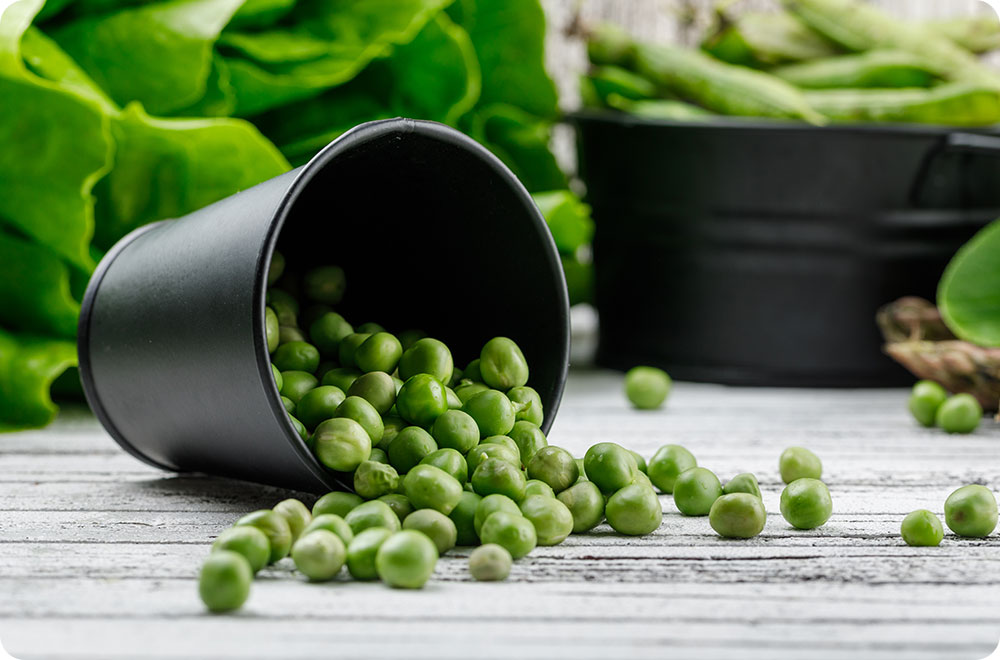Pea Protein
Pea Protein vs. Other Plant Proteins – A Comparative Analysis
In the ever-growing realm of plant-based nutrition, selecting the right protein source can significantly impact your health, fitness goals, and even your environmental footprint. Among the plethora of options, pea protein has risen to prominence for its impressive profile and benefits.
But how does it stack up against other plant proteins? This guide offers a comparative analysis of pea protein and other popular plant proteins, delving into aspects such as amino acid profiles, digestibility, environmental impact, and more.
The analysis reveals that while many plant-based proteins offer valuable health benefits, pea protein’s comprehensive nutrition, allergen-friendly composition, and ecological advantages position it as a superior choice for a wide range of dietary preferences and environmental considerations.
Pea Protein Overview
Derived from yellow split peas, pea protein is lauded for its high protein content, digestibility, and complete amino acid profile. It’s particularly rich in branched-chain amino acids (BCAAs), which are crucial for muscle growth and repair. Pea protein is also hypoallergenic, making it a suitable option for individuals with certain dietary restrictions.
Key Benefits:
- Complete amino acid profile
- High in BCAAs
- Hypoallergenic
- Environmentally sustainable
Comparative Analysis With Other Plant Proteins
Soy Protein
Soy Protein Overview:
Soy protein is one of the most established plant proteins, derived from soybeans. It is a complete protein, containing all nine essential amino acids, and is comparable in protein content to pea protein.
Comparison:
- Amino Acid Profile: Both soy and pea proteins are complete, though soy has slightly higher methionine content.
- Allergenic Potential: Soy is a common allergen, which may limit its suitability for some individuals, unlike pea protein.
- Environmental Impact: Soy farming, especially non-organic, has been criticized for deforestation and pesticide use. Pea protein often boasts a smaller environmental footprint.
Rice Protein
Rice Protein Overview:
Rice protein, typically derived from brown rice, is another popular plant-based protein. While it’s rich in certain amino acids, it’s lower in lysine, making it an incomplete protein on its own.
Comparison:
- Amino Acid Profile: Pea protein offers a more balanced amino acid profile, including sufficient lysine, which rice protein lacks.
- Digestibility: Both proteins are highly digestible, but pea protein’s completeness gives it an edge in supporting overall health.
- Environmental Impact: Rice cultivation requires significant water, whereas pea protein production is more water-efficient.
Hemp Protein
Hemp Protein Overview:
Hemp protein comes from the seeds of the hemp plant. It’s not only a good source of protein but also offers omega-3 fatty acids and fiber.
Comparison:
- Amino Acid Profile: Hemp protein contains all nine essential amino acids but is generally lower in lysine and leucine compared to pea protein.
- Nutritional Extras: Hemp offers beneficial fats and fiber, which pea protein lacks. However, for pure protein supplementation, pea protein might be more effective.
- Sustainability: Both hemp and pea protein score high in sustainability, with minimal environmental impact.
Almond Protein
Almond Protein Overview:
Almond protein is made from almonds and is a relatively new entrant in the plant protein market. It’s rich in vitamin E and magnesium but is not a complete protein.
Comparison:
- Amino Acid Profile: Almond protein is lower in essential amino acids, especially lysine and BCAAs, compared to pea protein.
- Allergenic Potential: As a tree nut, almonds can be allergenic to some, while pea protein is generally hypoallergenic.
- Environmental Impact: Almond cultivation is water-intensive, making pea protein the more eco-friendly choice.
Conclusion
Pea protein stands out among plant-based proteins for its complete amino acid profile, hypoallergenic nature, and environmental sustainability. While other plant proteins like soy, rice, hemp, and almond offer unique benefits, pea protein’s balanced nutritional offerings and minimal ecological footprint make it an excellent choice for those prioritizing health and the environment. Whether incorporated into smoothies, baked goods, or protein bars, pea protein offers a versatile and effective way to meet your protein needs sustainably.

